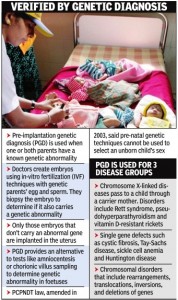Shubha and Nitin, a Thane couple in their early 30s, have been regularly visiting an IVF clinic in south Mumbai for two months despite neither of them being infertile. They both carry a faulty gene that increases their risk of bearing children with thalassemia, a blood disorder that requires weekly transfusions. With a test-tube baby , they can rule out thalassemia in their babies.
Clearly , assisted reproductive technology (ART) are changing. From helping infertile couples have babies, ART has evolved to assist people in having genetically healthy babies. This has been possible due to improved pre-implantation genetic diagnosis (PGD), a procedure of carrying out genetic testing on embryos created in a laboratory . “Only the embryos that don’t have genetic defects will be implanted in the womb,” said infertility specialist Dr Firuza Parikh from Jaslok Hospital, Pedder Road, who is treating Shubha and Nitin and was the first in India to offer PGD 15 years back.
PDG is not new or non-controversial (the present-day Pre-Conception and Pre-Natal Diagnostic Techniques Act was amended in 2003 to say that PGD cannot be used for sex selection), but the techniques are fast evolving. Laboratories such as Ahmedabad’s Supratech Micropath, Delhi’s Nova IVI and private genetic testing labs now offer cutting-edge genetic tests.
This has resulted in more couples opting for it. Bhayander, Maharashtra, resident Kusum, who like Shubha is a thalassemia minor, is seven months pregnant with a genetically normal baby . Using invitro fertilization techniques, Dr Parikh created seven embryos -literally in a petri dish -for Kusum and Sumeet. “Six didn’t have the gene for thales semia major. We implanted three into Kusum’s uterus that resulted in a single pregnancy,” said Dr Parikh.
Dr Kamala Selvaraj started using PGD for patients in Chennai last year. “Even though PGD adds cost to the treatment, couples who are keen to have genetically healthy babies opt for it,” said Dr Selvaraj, who has helped 25 couples in a year.PGD increases treatment cost by 20-25%, but doctors say it’s more affordable, and less emotionally wrecking, than lifelong treatment or care for genetic abnormalities.
Infertility specialist Dr Aniruddha Malpani from Colaba said PGD requires probes customized for each genetic abnormality . “It is too specialized and cannot be offered at all laboratories. It requires a skilled person to perform a biopsy on an embryo without damaging it,” he said.
Child rights activists have frowned upon the possibility of such techniques being abused for sex selection, but there are a little over 100 couples countrywide who have got genetically normal babies due to PGD.
“Assisted reproductive technology has moved beyond helping only infertile couples, its reach spreads to those who are otherwise fertile but are at a risk of having children afflicted with genetic disorders such as thalassemia major, Duchenne muscular dystrophy , Huntington disease, Down Syndrome, Turner syndrome and unbalanced chromosomal translocations, many of which are lethal,” said Dr Parikh, who has helped 76 couples in three years.
 Gestational Surrogacy Gestational Surrogacy India: A Hub of Surrogate Mother Delhi
Gestational Surrogacy Gestational Surrogacy India: A Hub of Surrogate Mother Delhi




